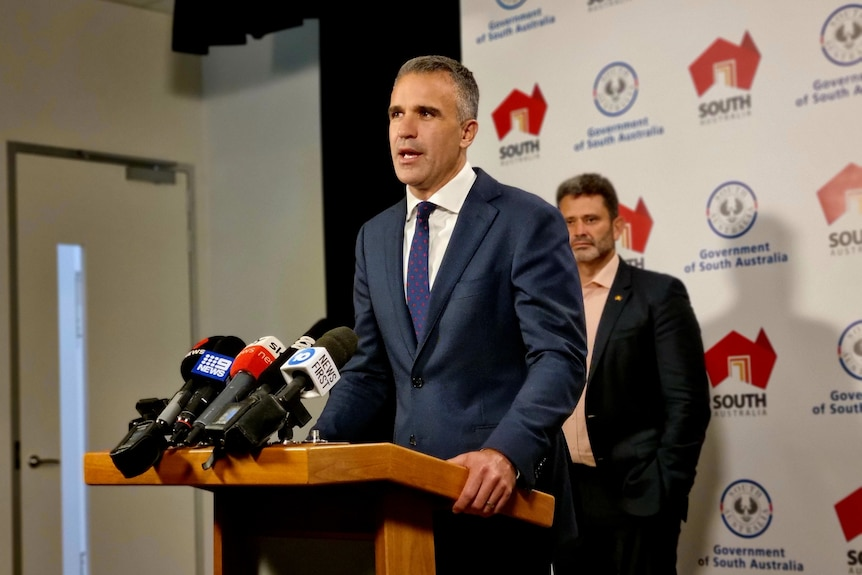Snowtown accomplice Mark Haydon's imminent release triggers proposed law change
· In short: SA's government will try to change serious and high-risk offender legislation to ensure Mark Raymond Haydon can be supervised when he completes his jail sentence.
· The 65-year-old is due for release in May after spending 25 years behind bars for assisting the Snowtown murderers in covering up the crimes.
· What's next? The government said it will introduce legislation to parliament on Tuesday.
New legislation will be urgently introduced to South Australia's parliament as part of a bid to impose controls on Snowtown murders accomplice Mark Ray Haydon, ahead of his expected release from prison.
Haydon is one of four men who were jailed over the Snowtown murders, also known as the "bodies-in-the-barrels" serial killings.
The 65-year-old is due for release in May after 25 years in jail for assisting the murderers in covering up the crimes, which made national headlines in 1999 when eight bodies were found in six barrels in the old bank vault in the Mid North township of Snowtown.
The government today said the proposed law changes, which will be introduced to parliament on Tuesday, would broaden the definition of serious and high-risk offenders to include people who assist in murders and sexual crimes, or in covering them up.
The announcement comes a day before Haydon — who is not automatically deemed a high-risk offender under current laws — is due to have a parole hearing.

Peter Malinauskas says the change was approved by cabinet on Monday morning.(ABC News: Rory McClaren)
In a parallel move, Attorney-General Kyam Maher will apply to the Supreme Court to have Haydon placed on an extended supervision order, which could restrict where he lives and what he does.
"Mark Haydon was convicted in relation to some of the most horrific crimes this state's ever seen," Mr Maher said.
"It is burnt into the psyche and the memory of South Australians, the crimes that were committed, so we want to make sure we're doing everything we can to keep South Australians as safe as possible.
"It's the government's position that Mr Haydon falls within the definition of a high-risk offender."
Mr Maher said he has already instructed the government's lawyers to pursue an extended supervision order for Haydon, who was convicted of helping cover up the deaths of seven victims.
'Gap in the law'
Legal experts have said that, if a court does not designate Haydon as high risk, authorities would be powerless to stop him being released without restrictions or supervision at the end of his sentence.
The Snowtown killings were committed by John Justin Bunting, Robert Joe Wagner and James Spyridon Vlassakis, and have become notorious for the ways in which the victims were killed and their bodies disposed of.
Premier Peter Malinauskas said the proposed legislative change was approved by cabinet on Monday morning, and that the government plans to introduce it to parliament when it sits on Tuesday.
"We are very clear, in our view as a state government, that those people who are convicted of serious crimes, particularly relating to people who assist murders post the fact, should be subject to extended supervision orders," he said.
"They should be deemed to be a high-risk offender.
"We are calling on the parliament to act quickly."
Mr Malinauskas said a successful application for an extended supervision order would potentially subject Haydon to a "whole suite of different measures".
"It can result in electronic monitoring through ankle bracelets, it can result in the application of curfews," he said.
The Attorney-General said Haydon's case had exposed a legal loophole that needed closing.
"It's shone on a spotlight on what we think is a gap in the law," Mr Maher said.
"If you assist during or before a crime at the moment, you're captured by the definitions in the High Risk Offenders Act and could be subject to the High Risk Offenders Act automatically.
"But if you assist afterwards, you don't get that automatic deeming in the high-risk offenders regime, and we think that's a gap."
Human rights barrister Claire O'Connor SC told ABC Radio that the government's action was "appropriate".
"All it's doing is extending the legislation which we've had since 2015 that enables an attorney-general to apply to a court to ask that a court rule that someone should be supervised if they are a high risk offender," Ms O'Connor said.
"It's actually quite a sensible approach really, because the list of offences that are coming under the 2015 legislation didn't include the kind of offences that Mr Haydon has committed."








